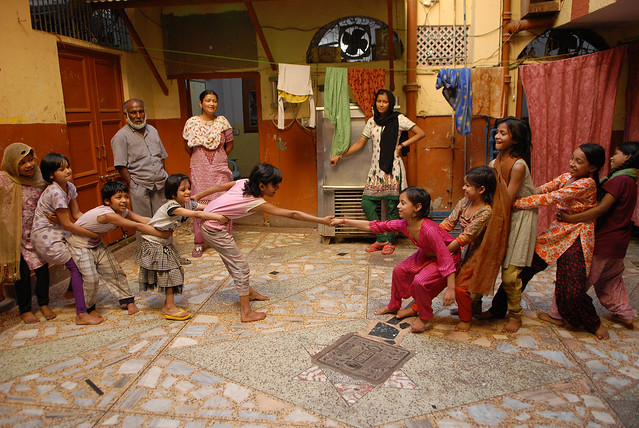By Mohammed Anas,
New Delhi: Little Zoobi was dropped by her mother a year back at ‘Bacchon Ka Ghar’, Delhi’s oldest orphanage, in Matia Mahal locality in the walled city. She has now accustomed to her new home, bajis (wardens), sahelis (friends) and aapis (elder sisters). Only occasionally, she craves for her home and her late father. But solace comes in the company of Shaila, Ashiya, Ruby and others who have also lost their fathers and share the shelter with Zooby.
Stories of Zoobi and her housemates narrate similar tales: their mother or relatives leave them at the Ghar as they couldn’t manage to raise and educate them. The Ghar does so until they turn 18 and then are returned to their guardians.

The Ghar houses around 50 girls, aged 7-18.
Bacchon Ka Ghar was started by Hakim Ajmal Khan, educationist, freedom fighter and legendary unani medicine practitioner in 1891 in Daryaganj as a shelter for orphaned boys. Later, a branch of it was started in an old world style haveli in a Matai Mahal alley near the historic Jama Masjid.
Girls and their wardens lament the congestion in their home and the location of their house. “We, 50 girls and five staff members, live in six rooms. Our street is too narrow that only one man can walk at a time and it is located in such a dense area that we fear to let girls out after they return from school,” said Ayesha Khan, the warden, referring to untoward incidents involving women reported in Delhi on a regular basis.
But wardens, Ayesha and Roshni Jahan, and guard Sadood Miyan are happy that they are successfully running a family of 50 girls in a densely-populated locality which at times makes these girls feel alienated, but at other times, they also receive showers of its affection.
“As and when a marriage takes place in the vicinity, girls being girls, are curious and anxious to attend. They feel pain of being relation-less, relative-less. But some courteous neighbours make sure that they participate, have meals and revel in the festivity,” said a senior inmate, who was shy to share her name.

Girls are admitted to the Ghar either by their mothers or by some relative. “Among Muslims, a child is considered yateem (orphan) if his or her father dies. We admit such girls whose mothers or guardians come with the death certificate of their fathers. The trust manages all expenses of children and their education,” said Haji Mian Faiyazuddin, chairman of the Trust running the Ghar.
Children at the Ghar, both boys and girls, are sent to nearby primary and secondary schools in the walled city. They are also additionally taught some courses in computer programming, music, sewing and other courses to help them develop professional proficiency.
One of the inmates, Ashraf, who is in Class VIII and plays guitar to the satisfaction of his music teacher, says that he loves to sing Urdu poetry on modern musical notes. His classmate Subhan says he was learning the Quran by heart to become hafiz.
Apart from many teachers employed in various schools of Delhi, the Ghar also produced late Bollywood writer and eminent poet Akhtar ul Iman, who was two-time recipient of the coveted Filmfare award and also the Sahitya Akademi award, the highest literary honour conferred by the Indian government.
Sadly, the luminous connection could not fetch the much required funds and government attention the Ghar deserved. “Even we ourselves have never tried to reach the government or any political organisation for help. We collect funds from well-wishers and socially conscious Delhiites to run these Centres,” said Faiyazuddin. He along with other trust members like Tejpal Bharti roam in the whole city to collect funds.
“While most of the time, we roam in different places to collect money, sometimes people themselves come to deposit their zakat and sadqa. Somehow, we manage to raise these kids and provide them decent education up to Class XII,” said Faiyaz.
Unfortunately, the Delhi government, which also has a minister in its Cabinet who represents the constituency where the Ghar is situated, seems to have no plan to assist the Ghar.
“They don’t approach us,” was the response of Asim Ahmed Khan, MLA from Matia Mahal, and the Food and Supply Minister in the Delhi government, when this correspondent probed him about his plans for his constituency and the urgent attention the orphanage demands.

Municipal Corporation of Delhi (MCD) in North Delhi provides a paltry Rs 250 per child per month assistance to the Ghar. “Even that is released after several visits to the MCD office,” said a clerk at the Trust office.
This correspondent also contacted Delhi Chief Minister Arvind Kejriwal’s office to know whether his government nurtures any plan for the Ghar. He didn’t get any reply till the writing of this report.
“With our limited funds, we manage to develop these children sensible enough to face life ahead. Those exceptionally talented are also helped to study in better schools and colleges. Some boys have managed to become engineers and one girl qualified for Company Secretary’s course after completion of her studies here. We hope that the government realises its responsibility for the orphanage and helps build it a proper hostel for these children. And if not the government, then the Muslim community should come forward,” said Faiz Ahmed, manager of the staff at the Ghar.
Interested people can directly contact:
Bacchon Ka Ghar
Haji Miyan Faiyazuddin, chairman of the Trust, and owner of Haji Hotel in front of Gate No I, Jama Masjid
011-23266478, 9810715159
011-23268348
Faiz Ahmed, Bachon Ka Ghar
In Front of Subzi Mandi, Daryaganj
(Photo credit : Sanjay Vishwakarma, The Sunday Guardian)
Related:

